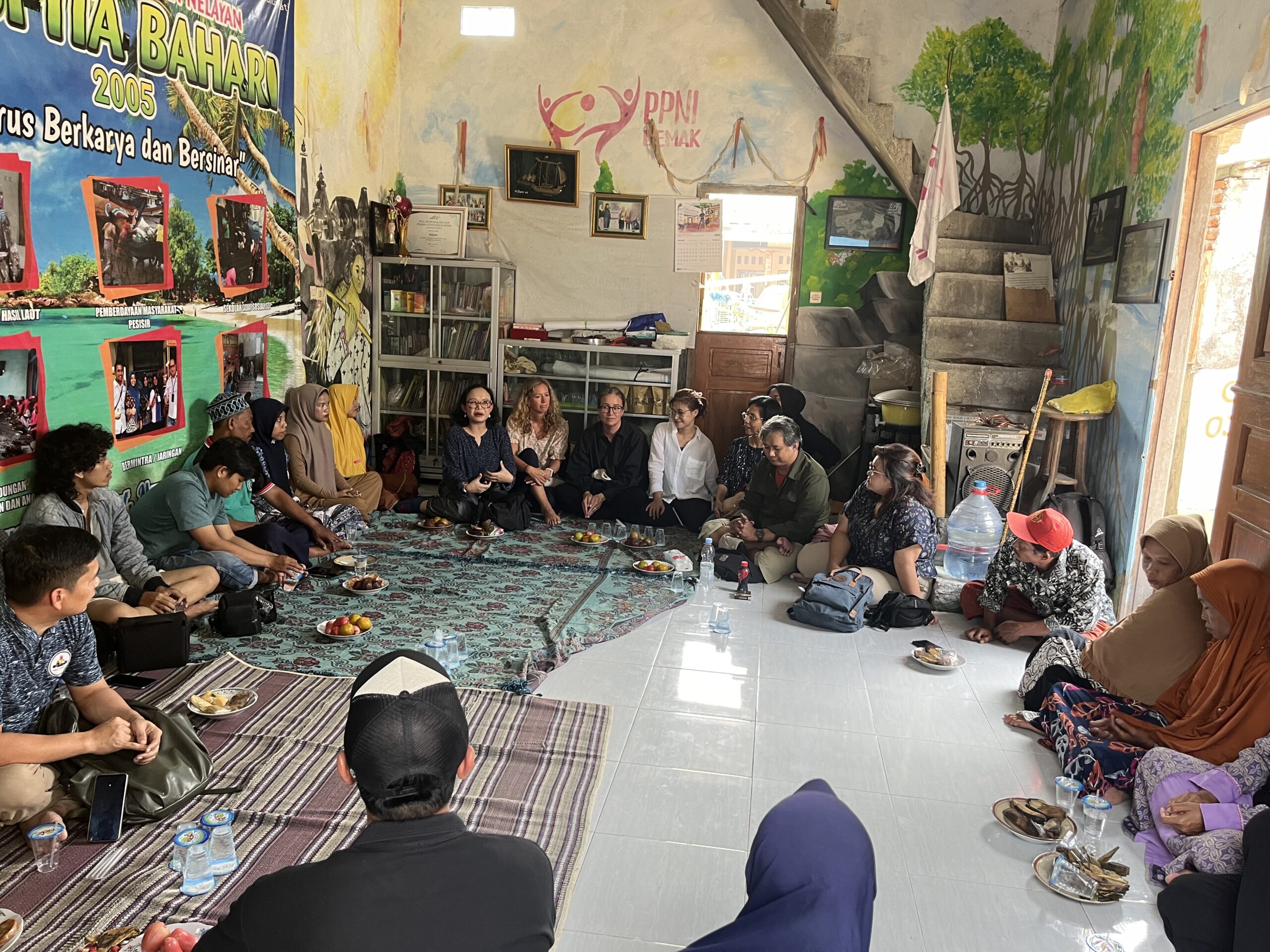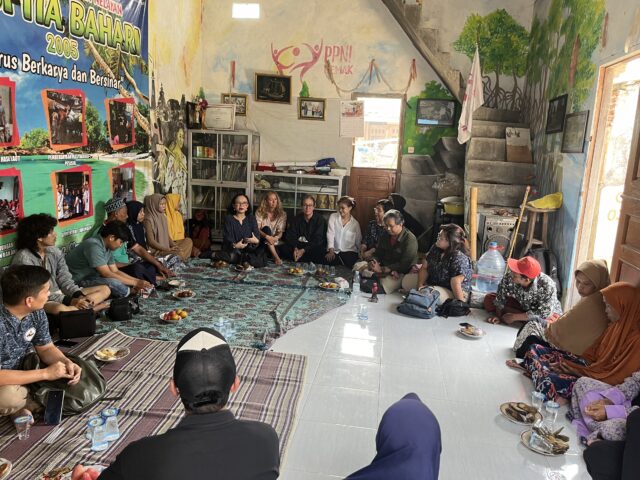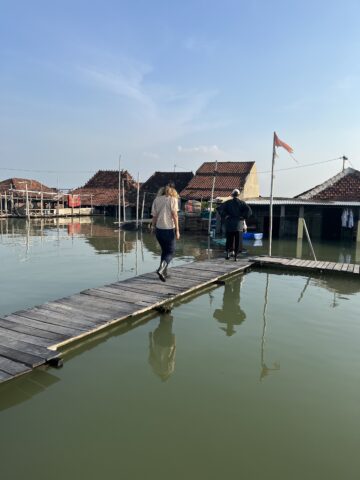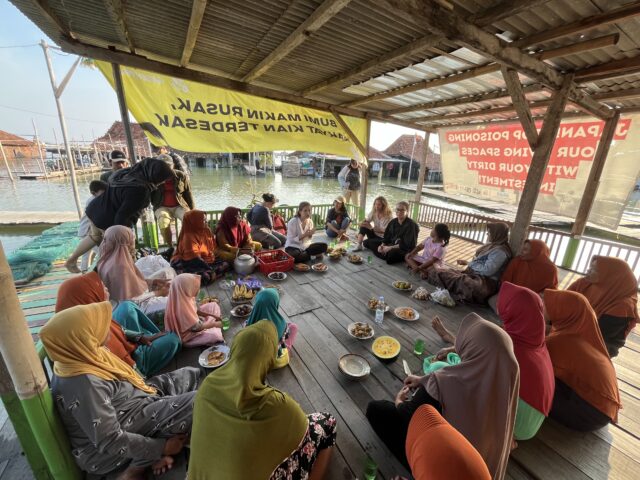
Climate Justice | June 14, 2024
Community Resilience and Women’s Struggle amid Climate Crisis: Insights from NORAD visit to Central Java
Ruhaina Zulfiani, Nisrina Nadhifah Rahman
On May 31, 2024, the FOCUS project team of Humanis hosted two representatives from the Norwegian Agency for Development Cooperation (NORAD) for a visit to two of the nine targeted villages of FOCUS project: Morodemak and Timbulsloko, Demak Regency, Central Java. NORAD is the Norway-based development agency that supported FOCUS’ implementation.
The purpose of the visit was to provide the NORAD representatives with a first-hand look at the conditions faced by fisherfolk particularly women fisherfolk and coastal communities in these villages. By witnessing the situation directly, it is hoped that NORAD can gain a deeper understanding of the dynamics and challenges of the FOCUS project beyond what usually appears on the reports and other reading materials.
Gabriella Catharina Ylva Kossmann and Silje Fagernes Anonsen both are Senior Adviser under Department for Climate, Nature and the Private Sector, Section for Oceans from NORAD visited Central Java after their previous activities in Banyuwangi, East Java. They arrived in Semarang in the afternoon on May 30, 2024, and we met for dinner that evening. During dinner, we talked about the general update of FOCUS project, highlighting the context of Central Java, particularly Semarang and Demak, two out of five districts where FOCUS is implemented. We talked about the challenges in managing the project from village to national levels, noting the positive reception from local governments but significant grassroots challenges, especially the difficulties faced by fisherfolk, especially women fisherfolk in coastal areas of Central Java.
While having dinner, we shared several preliminary findings from the FOCUS project, particularly regarding the climate crisis’ significant impact on fisherfolk’s lives in the nine villages intervened by FOCUS. The discussions highlighted issues such as the decline in fish catches, tidal floods, and the burden of loans against fishing households. We noted that although there are numerous regulations and government programs targeting fisherfolk and coastal communities, they often remain fragmented and lack integration. Moreover, community involvement, especially from vulnerable and marginalized groups including women, youth and person with disabilities, is still minimal and not genuinely inclusive. To address these issues, FOCUS plans to intensify dialogues involving local governments, community groups, and other relevant stakeholders. FOCUS aims to create an inclusive and meaningful space for communication and coordination, enhance collaboration among various parties to develop more inclusive, effective and comprehensive solutions to the challenges faced by fisherfolk and coastal communities in Central Java.
Continuing the topic of climate, our conversation took an interesting turn when a NORAD representative asked about the level of interest among Indonesian young people in climate and environmental issues. It is evident that young people in Indonesia are increasingly engaged in efforts to address climate change and environmental challenges. Initiatives such as movement to reduce single-use plastics, planting trees, and recycling are gaining momentum among the youth. Moreover, many young Indonesians are actively involved in policy advocacy related to climate and environment. They collaborate with various organizations to push for regulations on waste management, forest conservation, and biodiversity protection, including the sustainable management of marine and coastal resources, which is one of the key issues the FOCUS project addresses.
Challenges and Triumphs in Morodemak village
On the morning of May 31, 2024, the FOCUS project team of Humanis and the two NORAD representatives, departed from Semarang to Morodemak village. The usual one-hour journey took over two hours due to road repairs causing traffic jams. Upon arrival, we were warmly welcomed by the villagers and representatives of Demak Regional Planning Agency at the Puspita Bahari1 Secretariat.
 Photo 1. FOCUS project team of Humanis, KIARA and NORAD Representatives at Puspita Bahari secretariat. 31 May 2024. Source: Ruhaina Zulfiani
Photo 1. FOCUS project team of Humanis, KIARA and NORAD Representatives at Puspita Bahari secretariat. 31 May 2024. Source: Ruhaina Zulfiani
The villagers, mainly fisherfolk and coastal communities accompanied by FOCUS’ implementing partner, KIARA expressed significant concerns about the plan for sand mining project development by the government. They strongly oppose this plan, with a concern that it will exacerbate the village’s flooding issues. Morodemak village is already vulnerable to tidal floods, which since 2022 has caused the loss of mangrove-tourism spots. The villagers’ objection toward the sand mining project is based on the reasons that sand mining will further destabilize the area, increase the risk of their village being even more sinking and damage the local ecosystem. Residents recall that the local government agency previously held a discussion about the sand mining project. However, the invited representatives were not fisherfolk, resulting in many important concerns not being adequately conveyed.
S, a former garbage collector from Morodemak Village, shared his experiences during the visit. In Morodemak village, waste is collected and transported using motorbike carts. Despite the high risks involved, such as frequent falls during his six months on the job, the waste management agency does not provide necessary safety gear. Workers must purchase their own masks, boots, and helmets. The collected waste includes both organic and inorganic materials, with a significant amount of inorganic waste that could be recycled. However, there has been no government initiative or program to process or recycle waste in Morodemak village.
Both men and women fisherfolk begin their activities at 2 am. Together with her husband, women fisherfolk will cast nets in the sea, 20 miles from shore, before sunrise. For women, gaining recognition as fishers has never been easy. They faced numerous rejections from the village government and their men counterparts, who argued that the identity of fisher was not appropriate for women.
In addition to the risks of unpredictable high waves and strong winds that can endanger them at sea, threats from larger vessels are also common. Many of these large vessels owned by businessmen, operated in the fishing area of Morodemak village. The crews of these vessels often intimidate small fishers causing fear and discouraging them from venturing far from the shore. Moreover, many of the crew members are residents of Morodemak village and neighboring villages, creating the potential horizontal conflict between fisherfolk and the ship crews.
The women fisherfolk’s group in Morodemak village established the Puspita Bahari Cooperative in 2012 with an initial capital of 1 million rupiah and an initial contribution of 30 thousand rupiah per member. Each member was required to deposit 5 thousand rupiah every month and 6 days. Despite starting small, the cooperative now has savings of 15 million rupiah and has increased its membership to 30 members.
Throughout its development, Puspita Bahari Cooperative faced numerous challenges. Many members had to withdraw because they did not get permission from their husbands. However, with strong determination, the cooperative has continued to grow. Today, its loan capacity has significantly increased from only 200 thousand rupiah to 1.5 million rupiah per member.
‘Sinking’ yet strong, the one and only Timbulsloko village

Photo 2. Two NORAD representatives walk along a wooden bridge in Timbulsloko village. 31 May 2024. Source: Ruhaina Zulfiani
Right after the discussion in Morodemak was concluded, FOCUS project team of Humanis, KIARA, and the two NORAD representatives continued our journey to Timbulsloko village. Among the nine FOCUS’ targeted villages, Timbulsloko stands as the most severely affected by tidal floods. In the past month alone, the waters surged to over 2 meters, sinking the village. According to the locals, the onslaught of tidal flood dates to 2014 and has been escalating since 2017 due to the development and the operation of Tanjungmas Port in Semarang. After careful consideration, we decided to proceed to Timbulsloko village until we reached the point where we had to leave the car and continue our journey by boat.
During high tidal floods, villagers are struggling to access clean water, with pumped water often taste salty. Consequently, they resort to collecting rainwater for bathing and washing, and purchase water for drinking. The escalating frequency of these tidal floods has forced about 40 percent of Timbulsloko villagers to relocate in search of new livelihoods.

Photo 3. Discussion with women fisherfolk at Timbulsloko village. 31 May 2024. Source: Ruhaina Zulfiani
The government’s attention to Timbulsloko village increased during the COVID-19 pandemic, particularly after Masnu’ah, the Chairperson of the Puspita Bahari, initiated a fundraising campaign with support from KIARA. Following this effort, the government responded by providing assistance, including the development of bridge infrastructure in the village.
Concluding the visit, Timbulsloko villagers emphasized their need for sustainable support from the government, beyond mere infrastructure or temporary aid. They aspire to adapt to their unique environmental conditions more effectively.
Drawing inspiration from the Bajo community, known for their ability to thrive on the water, Timbulsloko residents believe they too can succeed with the right support. They envision a collaborative effort involving the government, non-governmental organizations like Humanis and KIARA, and NORAD as the supporter. Through inclusive and meaningful engagement, they hope to empower themselves and future generations, achieving a better quality of life for their entire community.

